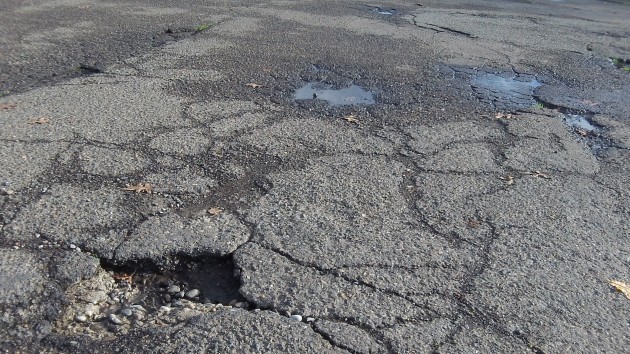
Chances are small that particular streets would be repaired in our lifetimes even if voters approved an Albany gas tax.
Albany City Council members seem to like, in principle, the idea of a local gas tax to pay for fixing streets badly in need of repair. But they have doubts whether this fall is the right time to ask voters to approve such a tax, or whether there’s enough time between now and then to explain the proposal well enough so it will pass.
Prompted by Mayor Sharon Konopa, the council kicked around a city gas tax at a work session Monday. One central issue was whether Corvallis was preparing to put a similar measure on the general election ballot there. Konopa thought the Corvallis council was waiting for Albany to make the first move. Others including Councilor Floyd Collins said they’d been told earlier that Corvallis would not be ready for an election this fall.
Who cares, you may be thinking. If Albany had a local tax and Corvallis didn’t, or vice versa, would motorists other than commuters make a 20-mile round trip in order to fill up where gas cost 3 or 5 cents less? In any case, the way I heard it, Albany officials will try to nail down whether or not Corvallis plans to put a gas tax on its ballot for the election Nov. 8.
Konopa pushed for an election in November, and Councilor Bill Coburn seemed to agree, saying it’s not a complicated issue and voters understand that money is needed to fix streets that are falling apart.
Others had doubts. Councilor Bessie Johnson thought it’s too late now to prepare for a November election. She also demanded that any ballot proposal guarantee that tax revenue be used only for paving work. She wanted none of the money spent on engineering, but others explained that engineers would have to prepare paperwork to put paving jobs out to bid.
Collins, a retired public works director, fully supports more revenue for street repairs. But he said the city should first complete enactment of a storm water utility fee — or rain tax, as I call it. The council expects to impose a mandatory storm water service fee in the fall, to be effective next spring.
Councilor Dick Olsen said the general election will likely see a heavy turnout and voters will be in a “negative mood.” Besides the presidential election, Oregon will have to decide on a state ballot measure by public employee unions calling for a big corporate tax increase, one that likely would raise prices and have the effect of a general sales tax.
According to the city staff, a local 3-cent gas tax might — and this was pretty much a guess based on the experience in Springfield — raise $750,000 in additional revenue. Collins noted that this amount would pay for rebuilding two blocks of a local street. At that rate, fixing all the streets that need it would take more than 200 years. So identifying street projects before the election would hardly persuade many people that if they vote yes, their street will get fixed.
All this may come up again Wednesday night at the council’s regular meeting. But unless Corvallis tells Albany that “yes, we are going ahead and are counting on you to do the same,” my guess is that the council will put off consideration of a local gas tax until next year. (hh)

So, the City Council is attempting to CONSPIRE to fix prices?
Observation from a mountain-state road trip — low fuel prices tie to broken-down road surfaces (interstate, state, local). The highest fuel prices we in California, as was the highest road use. Surfaces were above average (based on 40k cross country miles in the last few years)
Policy recommendation — if you want good road surface, free of potholes, pay for it. If you don’t pay, don’t whine about tire, shock, alignment, etc maintenance because you’ve already saved less than that……….
Do you mean to tell me that there has never been any money budgeted for street maintenance in this city? Who has been in charge of that? That is just incomprehensible.
Pot tax (recreational) for the pot holes… and everyone remember to VOTE!
No. Money has been budgeted, but not enough.
True, but they budgeted all that was available. Folks for decades now have continually required that tax revenue be “dedicated” to a specific use (note pot tax statement above). That has resulted in virtually every service being a tax island.
And even the rec tax pot which is really a sin tax goes to a couple islands. Neither of which are roads. Education and addiction recovery, I believe.
The rec. pot tax monies that are distributed back to communities by the state (based on population) are very much already earmarked for specific purposes. The 3% tax Albany could add can be used for any purpose.